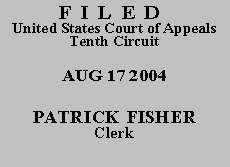

| DOUGLAS WEST,
Plaintiff-Appellant, v. DIANNE KOLAR, Law Library Supervisor; FELIX KELLY, Investigation officer; T JONES, Sergeant disciplinary hearing officer; REGINALD HINES, Warden; KIMBERLY OWENS, Records; MELINDA GUILFOYLE, Designee; RONALD WARD, Director DOC State of Oklahoma, Defendants-Appellees. |
|
Douglas West, an inmate of the State of Oklahoma proceeding pro se, brought this civil rights action pursuant to 42 U.S.C. § 1983. The district court granted summary judgment to defendants on three of the claims in his complaint. It dismissed his remaining claims because it found that West had not exhausted his administrative remedies as to those claims. While we agree with the district court that West did not exhaust all of the claims presented in his § 1983 complaint, a different disposition is required. The district court should have either dismissed the entire complaint to permit West to exhaust his administrative remedies or, in the alternative, have given West the opportunity to dismiss his unexhausted claims and to proceed solely on those he had exhausted. For this reason, we vacate the district court's order and remand.
West's complaint contains nine claims for relief. The magistrate judge assigned to this case concluded that West failed to exhaust his administrative remedies pertaining to Counts One, Two, Six, Seven, Eight, and Nine, and recommended that these counts therefore be dismissed without prejudice. He further recommended that summary judgment be granted to the defendants on the exhausted claims, Counts Three, Four, and Five. The district court adopted the magistrate judge's recommendation.
1. West's challenge to exhaustion
West challenges the district court's disposition of his complaint, contending that all of his claims have been exhausted. We review de novo the issue of whether West exhausted his administrative remedies. Jernigan v. Stuchell, 304 F.3d 1030, 1032 (10th Cir. 2002). The pertinent statutory provision provides that "[n]o action shall be brought with respect to prison conditions under section 1983 of this title, or any other Federal law, by a prisoner confined in any jail, prison, or other correctional facility until such administrative remedies as are available are exhausted." 42 U.S.C.A. § 1997e(a).
The Oklahoma Department of Corrections provides a multi-step inmate grievance procedure. See R. doc. 22, ex. A. Having reviewed the record in this case, we agree with the district court that West failed to complete this grievance procedure as to the claims raised in Counts One, Two, Six, Seven, Eight, and Nine of his § 1983 complaint.
The district court concluded that no such exhaustion problem existed as to Counts Three, Four, and Five of West's complaint. These counts relate to a disciplinary procedure instituted against West for lying to staff about having a court deadline and needing additional library time. The grievance policy provides that "[m]isconduct reports received through the department disciplinary procedures may not be appealed through the grievance process," but are instead appealed through the misconduct appeals process. Id. at 2 (Grievance Policy, Part II(b)(1)). The record reflects that West completed the misconduct appeals process as it relates to Counts Three, Four, and Five.
West contends, however, that he also raised the remaining six counts in his § 1983 complaint during the course of the misconduct appeals process. The "Offender's Misconduct Appeal Form" reflects that he did present the essence of Counts One, Two, and at least a portion of Count Seven as part of his misconduct appeal. See R. doc. 23, Att. K. These counts, however, concerned much broader issues than those involved in the misconduct proceedings. Count One charged a deprivation of meaningful access to the courts by denial of law library access. Count Two asserted West's right to assist other inmates with their legal work. The first portion of Count Seven asserted a denial of law library access. These counts should have been exhausted through the grievance procedure rather than as part of the misconduct appeal, and they therefore remain unexhausted for purposes of § 1997e(a). The remainder of Count Seven (pertaining to space in the library, the ability to check out law library books, and the posted law library hours) and the claims raised in Counts Eight and Nine were not even raised in the misconduct appeal and therefore also remain unexhausted.
2. Proper disposition of the complaint
West's complaint is a "mixed" complaint, containing both exhausted and unexhausted claims. We recently determined, analogizing to the rule for habeas corpus cases established in Rose v. Lundy, 455 U.S. 509 (1982), that where an inmate files a "mixed" § 1983 complaint, "the district court must ordinarily dismiss the entire action without prejudice" to permit the inmate to exhaust his unexhausted claims. Ross v. County of Bernalillo, 365 F.3d 1181, 1190 (10th Cir. 2004). It also follows from the adaptation of the rule in Rose v. Lundy that the district court may permit an inmate who has filed a mixed complaint in a § 1983 complaint to dismiss voluntarily his unexhausted claims and to proceed only on those he has exhausted. See Rose, 455 U.S. at 510. For these reasons, we must vacate the district court's order, to the extent it granted summary judgment on West's Counts Three, Four, and Five, and remand for either complete dismissal for failure to exhaust or to give West an opportunity to voluntarily dismiss his unexhausted claims.
The judgment of the district court is VACATED, and the case is REMANDED for further proceedings in accordance with this order and judgment.
Entered for the Court
Circuit Judge
*. This order and judgment is not binding precedent, except under the doctrines of law of the case, res judicata, and collateral estoppel. The court generally disfavors the citation of orders and judgments; nevertheless, an order and judgment may be cited under the terms and conditions of 10th Cir. R. 36.3.